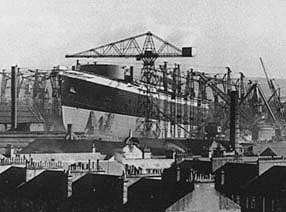1938 in Scotland
| |||||
| Centuries: |
| ||||
|---|---|---|---|---|---|
| Decades: |
| ||||
| See also: | List of years in Scotland Timeline of Scottish history 1938 in: The UK • Wales • Ireland • Elsewhere Scottish football: 1937–38 • 1938–39 | ||||
Events from the year 1938 in Scotland.
Incumbents
- Monarch – George VI
- Secretary of State for Scotland and Keeper of the Great Seal – Walter Elliot until 16 May; then John Colville
Law officers
Judiciary
- Lord President of the Court of Session and Lord Justice General – Lord Normand
- Lord Justice Clerk – Lord Aitchison
- Chairman of the Scottish Land Court – Lord MacGregor Mitchell, then Lord Murray
Events

Queen Elizabeth on the stocks
- 27 April – Second Division team East Fife F.C. uniquely win the Scottish Cup in Association football.[1]
- 3 May – Empire Exhibition opens in Glasgow.[2]
- 30 July – The Beano comic, published by D. C. Thomson & Co. of Dundee, goes on sale across the U.K.[3]
- 27 September – RMS Queen Elizabeth is launched at Clydebank; she is the largest ship in the world at this time.
- Iona Community established by Rev. George MacLeod in Glasgow.
- English landowner David Freeman-Mitford, 2nd Baron Redesdale, buys the island of Inch Kenneth.
- The Hermitage of Braid estate, adjacent to Blackford Hill, is gifted to the city of Edinburgh for recreational purposes by John McDougal.
- The Neolithic settlement of Rinyo on Rousay in Orkney is excavated by V. Gordon Childe.
- Broughton Place at Broughton in the Borders is built in the style of a traditional tower house by Basil Spence incorporating decorative reliefs by Hew Lorimer.[4]
- Turner & Newall establish an asbestos cement plant at Dalmuir.
- Agnes Mure Mackenzie publishes The Foundations of Scotland, the first of a 6-volume history.
Births
- 1 January - Neil Connery, actor, younger brother of Sean Connery
- 2 January – Ian Brady, born Ian Duncan Stewart, serial killer (died 2017 in Ashworth Hospital)
- 16 February – Willie Hamilton, footballer (died 1976 in Canada)
- 7 March – Alan Cousin, footballer (died 2016)
- 31 March
- Ian Gray, comics scriptwriter (died 2007)
- David Steel, Liberal and Liberal Democrat leader and 1st Presiding Officer of the Scottish Parliament
- 16 April – Gordon Wilson, Scottish National Party leader (died 2017)
- 5 June – Moira Anderson, singer
- 18 June - Michael Sheard, character actor (died 2005)
- 27 June – David Hope, judge
- 28 July - Ian McCaskill, weatherman (died 2016)
- 13 September – John Smith, Labour Party leader (died 1994 in London)
- 14 September - Nicol Williamson, actor (died 2011)
- 20 October – Iain Macmillan, photographer (died 2006)[5]
- 22 October – Alan Gilzean, footballer (died 2018)
- 28 November – Frank Haffey, goalkeeper
- John Paisley, actor, working in China
- Roland Poska, graphic artist (died 2017 in the United States)
Deaths
- 31 January – Sir James Crichton-Browne, psychiatrist (born 1840)
- 9 April – Moses McNeil, footballer, a founder of Rangers F.C. (born 1855)
- 11 April – David Alan Stevenson, lighthouse designer (born 1854)
- 25 April – Robert MacGregor Mitchell, Lord MacGregor Mitchell, Chairman of the Scottish Land Court 1934–38 (born 1875)
- 29 April – James Pittendrigh Macgillivray, sculptor and poet (born 1856)
- 2 July – John James Burnet, architect (born 1857)
- 29 August – John Macdonald, sportsman and physician (died 1861)
The arts
- Hugh S. Roberton writes the "Mingulay Boat Song".
gollark: It can plot graphs nicely using several different web applications.
gollark: Graphing ones cost something like £100. My *phone*, which has a very fast (comparatively...) processor, 32GB of storage, a 5" touchscreen and wireless networking, cost less than that.
gollark: Calculators seem weirdly expensive for what you get. Fancier ones anyway.
gollark: It has nice features, though the UI can sometimes be annoying.
gollark: <@163109867953979392> I use a Casio FX-991EX, though those might be more of a Europe thing.
References
- "Notable Dates in History". The Flag in the Wind. The Scots Independent. Archived from the original on 23 May 2014. Retrieved 21 July 2014.
- Pelle, Findling, ed. (2008). "Appendix B: Fair Statistics". Encyclopedia of World's Fairs and Expositions. McFarland & Company, Inc. p. 416. ISBN 978-0-7864-3416-9.
- Penguin Pocket On This Day. Penguin Reference Library. 2006. ISBN 0-14-102715-0.
- "Broughton Place, Broughton". British Listed Buildings. Retrieved 2 September 2014.
- "Iain MacMillan". Scotsman. Retrieved 23 February 2018.
This article is issued from Wikipedia. The text is licensed under Creative Commons - Attribution - Sharealike. Additional terms may apply for the media files.
